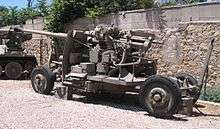100 mm air defense gun KS-19
| 100 mm air defense gun KS-19 | |
|---|---|
 KS-19 in Saint Petersburg Artillery Museum. | |
| Type | Air defense gun |
| Place of origin | Soviet Union |
| Service history | |
| Wars |
Korean war Vietnam war |
| Production history | |
| Designer | L. V. Lulyev |
| Specifications | |
| Weight | 9,550 kg (21,054 lbs) |
| Length | 9.45 m (31 ft) |
| Barrel length | 5.7 m (18 ft 8 in)[1] |
| Width | 2.35 m (7 ft 8 in) |
| Height | 1.60 m (5 ft 3 in) |
| Crew | 15 |
|
| |
| Shell | Fixed QF 100×695 mm. R[1] |
| Caliber | 100 mm (3.94 in) |
| Breech | Semi-automatic horizontal sliding-wedge[1] |
| Elevation | −3°/+85 |
| Traverse | 360° |
| Rate of fire | 15 rounds per minute |
| Muzzle velocity | 900-1,000 m/s |
| Maximum firing range |
Horizontal: 21 km (13 mi) Vertical: 12,700 m (41,667 ft) timed fuse. 15,000 m (49,213 ft) proximity fuse. |
100 mm air defense gun KS-19 (Russian: 100-мм зенитная пушка КС-19) was a Soviet anti-aircraft gun. Following the end of the Second World War the Soviet Union introduced into service the 100 mm KS-19 and 130 mm KS-30.
The KS-19 is a heavy towed anti aircraft gun that has largely disappeared from front line arsenals due to increased use of more effective surface-to-air missiles. Being a towed weapon an external form of mobility was required, usually an AT-S Medium or AT-T Heavy tracked artillery tractor. The 15 man crew were carried on the tractor along with ready use ammunition for the gun.[2] Ammunition was loaded as a single round into the loading tray and a well trained crew could fire 15 rounds maximum per minute.[2]
Anti Aircraft ammunition includes high explosive, high explosive fragmentation and fragmentation types. The KS-19's onboard sights can be used to engage air targets; however increased accuracy was achieved if used in conjunction with a fire control radar such as the SON 9 (NATO Reporting name 'Fire Can') and PUAZO-6/19 director.[2]
As the KS-19 is a heavy calibre Anti-Aircraft gun it also has some utility in the ground role especially against armored targets. As a result of this two armor piecing rounds were produced: the AP-T (Armour Piercing-Tracer) and APC-T (Armour Piercing Capped-Tracer) with the AP-T round reportedly able to penetrate 185 mm of armor at 1000 m.[2]
The KS-19 was used in action by communist forces in both Korea and Vietnam.
Recently Iran has built an upgraded automatic version of KS-19 named Sa'ir.[3]
Operators
Current operators










Former operators

















References
- 1 2 3 Foss, Christopher (1977). Jane's pocket book of towed artillery. New York: Collier. p. 257. ISBN 0020806000. OCLC 911907988.
- 1 2 3 4 Bishop C and Drury I. The Encyclopedia of World Military Power (1988). Temple Press/Aerospace publishing.
- ↑ "Archived copy". Archived from the original on 2012-01-26. Retrieved 2012-12-22.
- ↑ Cuban Revolutionary Armed Forces#Towed artillery
- ↑
- ↑ IISS 2007, p.236
- 1 2 3 4 5 6 Military Factory
- ↑ Trade Registers. Armstrade.sipri.org. Retrieved on 12 June 2015
- ↑ Equipment of the Syrian Army#Towed anti-aircraft artillery
External links
| Wikimedia Commons has media related to 100-mm air defense gun model 1947 (KS-19). |
